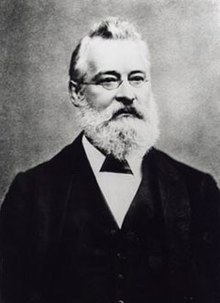John Newlands (chemist)
John Alexander Reina Newlands (* November 26, 1837 in London; † July 29, 1898 ibid) was an English chemist who made the first attempts to establish a periodic table of the elements between 1863 and 1866. At that time, about 60 different elements were known.
Newlands was the son of a clergyman. He studied at the Royal College of Chemistry in London from 1856 and was an assistant at the Royal Agricultural Society of England from 1857, but interrupted his studies to take part in the Italian War of Independence under Giuseppe Garibaldi as a volunteer (his mother was of Italian descent). By 1860 he was back in England. He had a private laboratory for chemical analysis from 1864 and taught at schools in London. From 1868 he was a senior chemist in a sugar factory and from 1886 he again had his own laboratory in London, where, with his brother, he devoted himself mainly to problems of sugar chemistry.
In 1864, Newlands found that when the elements are ordered by increasing atomic mass, the chemical properties repeat in every eighth position, which he compared to the octaves from music. He called his discovery the law of octaves. Later, Dmitri Ivanovich Mendeleev and Lothar Meyer also recognized the same connection. In England, the far more established chemist William Odling was working on a periodic table at about the same time, and had the advantage of having attended the 1860 Karlsruhe Congress with Stanislao Cannizzaro's idea of better values of atomic weights (while Newlands was fighting in Italy at the time). Odling also recognized periodicities (with period 16), but was much more reluctant to recognize a law in it.
Newland's theory was initially rejected by his contemporaries. He published his first work on it anonymously in 1863, his improved systems in 1864 (two systems) and 1865. The latter was a considerable improvement on its predecessors and now included 65 elements and was based on his Law of Octaves, which he published in 1866 at the same time as another considerable improvement to the system. In it he also drew a comparison with the octaves of music, for which he was attacked, but according to Scerri it was rather the generally negative attitude in England to such comprehensive theoretical systems that was the reason for the hostile attitude at his lecture to the London Chemical Society. His periodic system still had flaws (as did Mendeleev's); for example, it placed iron (a metal) in the same group as oxygen and sulfur. Newlands was not prevented from publishing, however (his articles appeared in Chemical News, for example), even though the London Chemical Society refused to publish his lecture (competition from Odling, who presided over the meeting, may have played a role in this).
Newlands was an industrial chemist with work mainly on sugar chemistry. He invented with Duncan a new patented process for purifying sugar. He also gave private lessons in chemistry. He never obtained an academic position.

John A. R. Newlands
Works
- with Charles G. Warnford Lock, Benjamin E. R. Newlands: Sugar: A Handbook for Planters and Refiners. Spon, London 1888, archive.org.
- On the discovery of the periodic law, 1884 (collection of his essays on the periodic system of elements)
- Relations Between Equivalents, Chemical News, vol. 10, 1864, pp. 59-60, pp. 94-95 (second system).
- On the Law of Octaves, Chemical News, vol. 12, August 18, 1865, p. 83.
- On the Law of Octaves, Chemical News, vol. 13, 1866, p. 130.
Search within the encyclopedia